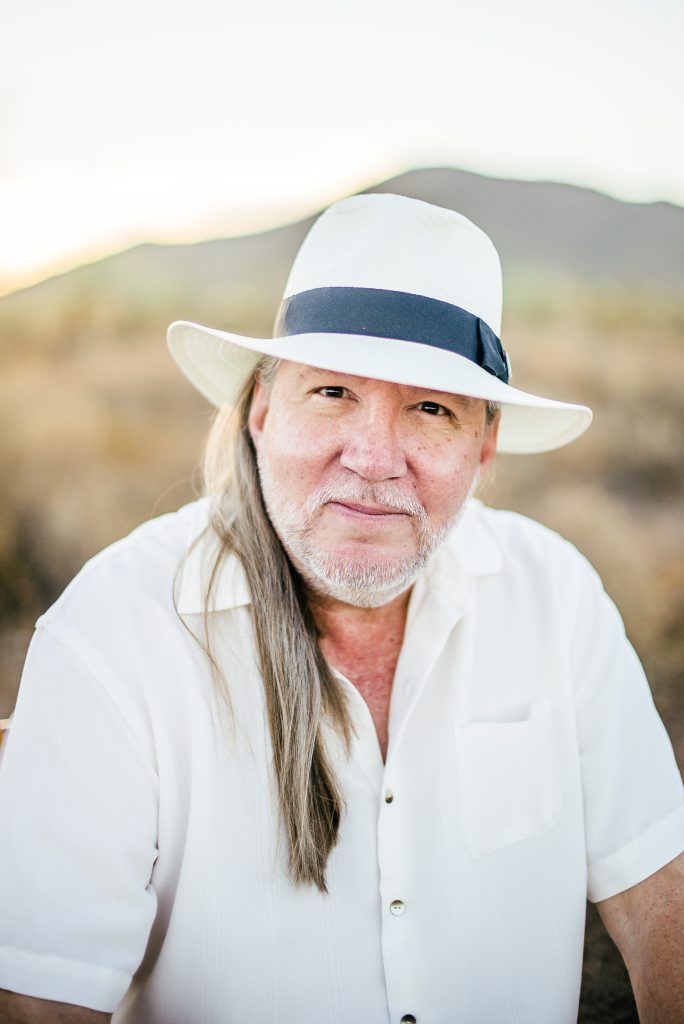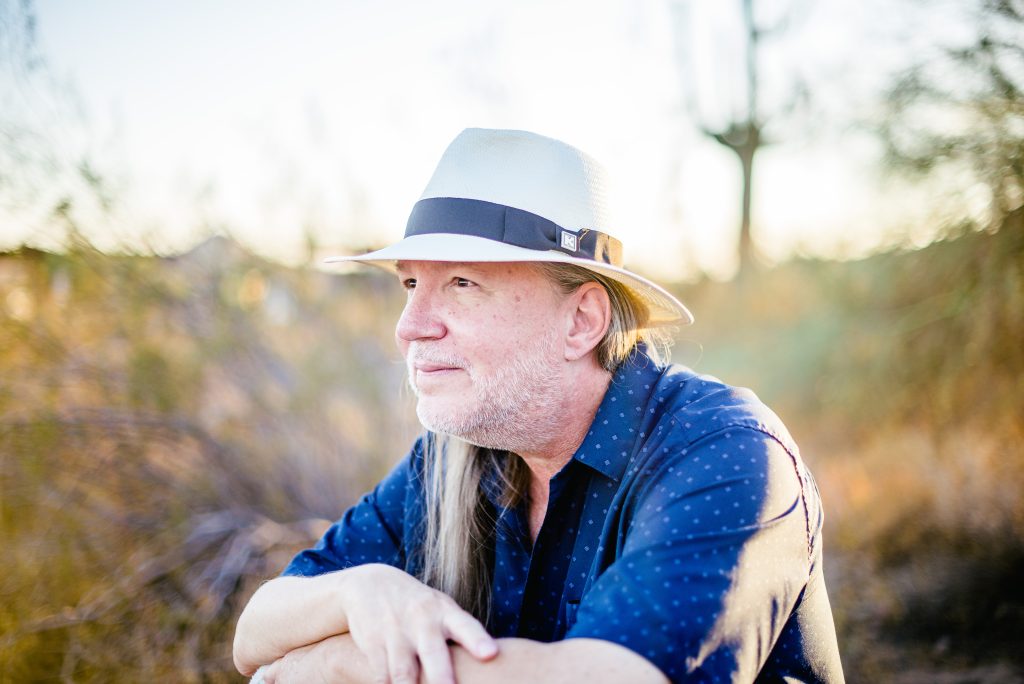Jesse Wallis
Poetry
Photo by Stephen Chernek
Jesse Wallis
Jesse Wallis has been a finalist for the University of Wisconsin Press Poetry Series and the Zone 3 Press Book Award in Poetry. His writing has been published widely in such journals as Bennington Review, Hampden-Sydney Poetry Review, Hayden’s Ferry Review, Image, New Ohio Review, North American Review online, Ploughshares, Southern Poetry Review, The Southern Review, and Zyzzyva. Born and raised in Phoenix, Arizona, he studied writing and film at the University of Iowa and, prior to that, art at Syracuse University and the California Institute of the Arts. Jesse lived in Aomori City and Tokyo, Japan, for nine years and has held positions in marketing, corporate communications, graphic design, and teaching English to non-native speakers. He currently works in human resources for a public school district in the Phoenix metro area.

Photo by Angie Puckett
Poems
Mercy — Barrow Street
Still, you can’t help but feel for the opposing pitcher /when your team is lighting him up in the first inning. /
Who hasn’t stood, front and center, on that precipice /
as everything you touch turns to shit, and you feel it /
all slip away through your fingers? Time spins foul. /
The strike zone becomes narrow as the head of a pin. /
You pray to all of the angels standing on it, but hear /
no reply. And how did you get here? One bad choice, /
one poor play, one missed opportunity after another. /
And then … the lost job, the lost house, the lost wife. /
As the catcalls die off, let him make his few aimless /
throws to hold the runner at first. May the boo-birds /
be silent as he gathers his thoughts. So quiet now in /
the ballpark, you could hear a pin drop, as he stands /
straight as a lightning rod. Looks to the plate. Holds /
his breath. Gives the world another turn in his glove.
Compass — Southern Poetry Review
There must be a secret map, somewhere, in the genome /of the spiral aloe. The serrated spades of the succulent’s /
thick needle-tipped leaves circle out like fallen dominos /
from light sage green at the center of its vortex to shades /
of olive and emerald on its outer whorls. With each new /
blade, it opens out farther into the world, each like a petal /
folding away from a single bud. The gyre of its spinning /
arms, a galaxy. The barbed gear teeth of its clockwork, /
ticking out time, as if all were moving according to plan. /
And even as it lies buried beneath the deep winter snows /
on the mountain slopes of Lesotho, it never asks: Where /
does this all lead? Is there an end to this urgent turning?
The War That Starts With M — Ploughshares
Now my father cannot remember the name of the war he fought in /seventy-odd years ago. When I remind him, he becomes belligerent /
about a war that never really ended, and one that could start again.
Not Korea, I know that much, son! It’s the war that starts with an /
M. To try and correct would not be helping him, he is so adamant /
about this war he can’t remember, but is certain he once fought in.
Not back on the flightdeck of the Boxer, prepping the jet engines /
for the pilots. Perhaps, in time, there are only nameless militants /
in any war like that, which never ends if it can always start again.
Still, he was somewhere, putting his young life on the line then /
for something. Is that enough to recall? Or too easy a sentiment, /
now that Dad can’t remember the name of the war he fought in?
Since all war starts with Murder, as offered an insightful friend, /
perhaps he’s not too far off. Yet we’re left with the predicament /
of wars that start, but don’t end, or that end, and then start again.
A truce, then. With a demilitarized zone. No one loses or wins. /
Let him be at peace, in the end. After all, what’s the difference /
if my father can’t put a name to this latest war he’s fighting in— /
this war that will end, someday soon, and will never start again.
will lift the warm barrel of the bat to his face and breathe /
in the flameless combustion from the friction of the ball /
against solid maple or ash. Players say the smell reminds /
them of the wood-burning kits they played with as kids. /
Blackening their names into balsa with the hot metal pen. /
The brief ritual, this offering of incense between pitches, /
will not change the outcome of any game. But in a sense— /
this connection of ball and bat and the body—is the game. /
A white dot disappears, a shooting star returned to the sky.
* * *
NASA’s InSight robotic lander was launched toward Mars /
carrying two silicon microchips a third of an inch square, /
etched by an electron beam with the names of 2.4 million /
inhabitants of Earth. Each letter of each individual name, /
a mere 1/1000th the width of a human hair. The weight of /
the chips was insignificant, irrelevant to fuel consumption, /
launch trajectory, or re-entry angle reaching the Red Planet. /
The names will have no bearing on the mission’s success. /
But in a larger sense, are they not the mission? The flames /
buffeting the heat shield, a silver ball landing in the dust.
Letters of Transit — Zyzzyva
Since the magic of Hollywood was economy, /to make more of less and fool the eye into /
suspending disbelief, little people were cast as /
the ground crew at the airport in Casablanca. /
And the cardboard Lockheed Electra Junior, /
waiting in the background for its unfinished /
passenger roster, could be built smaller and /
cheaper, an illusion masked by shallow focus /
and night and a thick, swirling fog of dry ice.
So when the twin engines startle into a blur /
and Rick turns from the thundering propellers /
to Ilsa, and both look back to Victor Laszlo, /
the one big truth we would see clearly was /
that anyone who loved anyone else on that /
rain-slick tarmac had to stop believing some /
illusion. That a chapter called the epic past /
was closing. And though their continuation /
in a common Resistance could be imagined,
what they had been, together and separately— /
the history of place they had been caught up /
in, and tried to escape from, and fought for— /
was even then becoming smaller and harder /
to see through the dark and the distance and /
the fog. … The way the white of paper, when /
the page is turned, obscures the faint mirror /
writing, bleeding through from the other side. /
Like faded letters of transit, used and forgotten.
Meadow With Poplars — Poet Lore
Claude Monet, 1875You stand in the middle ground, in front /
of the tall, slender poplars—knee deep in /
flowers of the field that follow a rutted, /
overgrown path to the horizon—looking
back. And though the blur of your face is /
only a soft daub of peach—the same size /
and shape as those lone scarlet blossoms /
opposite you, in the lower right corner—
it is for you, we can see, that we are here. /
For the quiet joy of your place in the field. /
How your white blouse mirrors the clouds. /
For your straw-yellow sunbonnet, the way
your body blends in that dappled light into /
rows of lavender and white petals, in thick /
brush and tall grasses of yellow and green. /
Here for this azure, early summer sky that
is half the day high, now that the scene is /
painted. Bright, open and waiting for you, /
for us alone, down an empty winding path /
in the shadeless noon heat of the meadow.
Wading — Hampden-Sydney Poetry Review
You laid your palms flat on the surface of the water /gently, feeling for its smooth boundary with the air. /
It was nothing important, just a momentary gesture.
We had stopped a minute at a pool within the river /
in the heat of a summer day; no one else was there. /
You placed your palms on the surface of the water,
high as your thighs, as you stood still and bent over. /
Dappled in light, skin pinkened by the sun and bare. /
Unimportant, it seemed, only a momentary gesture.
The quiet was broken by the chirps of a single bird, /
less than a breeze stirred a few strands of your hair. /
The touch of your palms on the surface of the water
barely made a ripple, a brief caesura in the measure /
of that long, flowing line you had entered unaware. /
Like it was nothing important, a momentary gesture.
Your reflection in that green rhymed your pleasure. /
The oak and aspen looked at themselves and stared. /
You laid your hands flat on the surface of the water. /
Nothing, and important, such a momentary gesture.
older than most of the women on the train that afternoon. /
And I would have followed her to any shade-drawn room. /
In traditional dress, on her way to some formal occasion, /
she stood near the doors, hand lightly grasping the strap, /
wrist bared from its trailing sleeve, balancing on her geta /
to the train’s steady rocking. I could sense her becoming /
aware of my interest, from where I sat near the opposite /
doors. Seeing, in that typically Japanese peripheral way, /
but not being seen to see. A sidelong glance of the world /
reflected in the corner of an eye. I reminded myself not to /
stare, but I couldn’t stop watching her. All of ten minutes, /
not much more, until she smiled without turning to me, /
bowed her head slightly and then stepped from the train, /
two or three stops down the line. I wanted to follow her /
out onto the platform, say something to her—but what? /
It wasn’t just the elegance with which she carried herself, /
the spring light, not just the kimono. It was that, too, and /
what the years had added but not taken from her beauty.

Photo by Stephen Chernek

Photo by Stephen Chernek
Contact Jesse

Photo by Angie Puckett
